- Home
- Marie Rutkoski
The Cabinet of Wonders Page 2
The Cabinet of Wonders Read online
Page 2
Astrophil was the exception to the rule. But then, he was the exception to almost every rule. He was well behaved from birth. He took his good manners as a point of pride. He learned Czech quickly, speaking in whole sentences when he was just days old. He was the only pet her father made who learned how to read. Astrophil actively sought out books on everything from poetry to how to make Turkish delight. Petra often teased him that he was filled with useless information. But while he learned many things Petra never would, he never managed to learn how to sleep. Most pets, when they were about two years old, would begin to doze for a few minutes at a time. A year later, they might be able to sleep through the night. But Astrophil, who was six years old, showed no sign of doing more than blinking once in a while.
Petra tidied the shop to make it presentable for business, dusting her father’s handiwork: horse bits and plows, intricately engraved silverware, a collection of music boxes, compasses, astrolabes, and clocks that began chiming ten o’clock. It was already late to open the shop. Dita’s husband, Josef, would have left hours ago to work in the brassica fields. Soon Petra would unlock the front door facing the street. She hoped that she might sell a few things. Above all, she hoped her friend Tomik would stop by.
Although it was incredible that she would have heard a shuffling of feet over the noise in the workshop, Petra did. She turned around to see David, Dita’s son. He was a few years younger than Petra. “Stella!” he called.
The tin raven flew across the room in a shiny blur and settled on the boy’s shoulder, gently poking her beak into his curly hair.
“Upstart crow,” Astrophil muttered.
“I am a raven!” Stella cawed back, insulted.
It was clear that the raven had no intention of being sold to an Okno villager or a traveling merchant charmed by her glossy feathers. The raven liked her life at the Sign of the Compass just fine, and had grown fond of David, who was stroking her head.
“Mother wanted me to see if you had finally woken up,” the boy mimicked Dita’s exasperated voice. “She wanted to know if you were taking care of your one duty in this house.”
“Well, I obviously am.”
“Well, you obviously can’t greet customers in your nightgown.”
Petra started to say something rude, but David began singing loudly, looking everywhere around the shop except at her. “Oh, she’s a lovely lass in her nightdress! But her hair’s a mess, I must confess!”
The raven cawed.
“Oh, she’s a—”
“David, be quiet!”
“—lovely lass—”
“Stop!”
He did, for he realized that she was no longer looking at him, but out the window. She had a worried expression on her face. “What is it?” he asked. He saw a cart driven by two men in tattered clothes.
“I’m not sure.” As she pushed the door open, Astrophil climbed into her hair and clenched his legs around a snarled lock of it, looking like a flower-shaped hairpin with eight petals. The animals eagerly rushed for the open door, but David darted across the room to stop them. He hustled them back into the cage.
The two men stepped down from the cart, one of them laughing. The other man glanced at Petra, looked up at the sky, and stretched in the sunlight. They turned away from her and walked toward the back of the cart, heaving at some load in the flatbed.
At first Petra could not believe that the long, angular form the two men carried was her father. But then his head flopped back in the fat man’s arms and she saw his long gray-black hair, his wide mouth, and the rust-colored bandage crossing his face.
She looked over her shoulder at David, who was waiting in the shop, gazing out the door, his eyes wide in horror.
“Dita,” Petra whispered. She had lost her voice.
But David easily found his. “Mother!” He spun around and ran into the dark depths of the house. “Mother!”
2
The Making of the Clock
THE TWO MEN carried Mikal Kronos into his shop.
Petra shut the door behind them. She felt mechanical, like one of her father’s inventions. She couldn’t look away from the cloth covering his face. It was stiff with old blood. Petra knew the bandage needed to be changed, but didn’t know if she could do it.
A thousand questions tried to claw their way out of Petra’s mouth, but only one escaped: “What happened?” Petra was astonished to hear her own voice. It was small and frightened.
“Your da had an accident,” the heavyset man replied.
Dita briskly entered from the hallway. Her back was straight, her hair wrapped in a dark blue scarf, and she was wiping her hands on her starched apron. David followed her, carrying Stella on his shoulder. Dita caught the tall man staring with curiosity at the bird. He glanced away, embarrassed.
“’Lo, missus,” his companion said. “My name’s Martin. Sorry to be the bearer of bad tidings. Your husband’s had a hard journey. Would you show us where we could set him down for a bit of rest?”
“He is my uncle.” Dita frowned. “Come this way. His bedroom is here,” she said, and showed them to a small room on the ground floor with a square window and a narrow bed.
After the two men had laid their burden onto the bed, Dita took her uncle’s hand and bit her lip as she looked at his bandages. “David, get some water.”
David ran out of the room. But Stella launched herself from the departing boy’s shoulder and flew back, settling on a bedpost. The raven craned her neck to watch as Dita gently peeled away the gauze covering her uncle’s face. “How did this happen?” Dita demanded.
The two strangers exchanged a look.
Petra hung back. Her hand was braced on the door frame. Dita’s back blocked Petra’s view of her father. Petra waited for someone to speak. When no one did, she answered her cousin’s question. “They said it was an accident.”
“Really.” Dita’s voice was flat. She pinned the men with a fierce glare. “An accident? You will have an accident, too, if you don’t get out of this house right now.”
Martin smiled and spread his hands. “Now, you can’t blame us for—”
The bird shrieked and sprang from the bedpost, diving at the men with sharp claws and a sharper beak. Startled, they ran from the house, tripping, cursing, and covering their faces with their hands as Stella darted at them like a flying dagger.
When Dita spoke to Petra her voice was both rough and kind. “I want you to leave the room as well.”
Petra hesitated. Then she slipped into the hallway. She ran upstairs to her room. Through the window, she could still hear the bird’s furious screaming.
After that, no one questioned that Stella belonged to the family.
DITA HAD MOVED into the house with her husband and son years ago, after a long drought that had made the brassica fields dry, crisp, and useless. There was no harvest that year, and the one the year before that had been poor. Farmers across Bohemia grew desperate. The prince’s court in Prague felt the pinch of higher prices for reserves of oil used for cooking, lighting lamps in fashionable homes, and making weapons, which relied on the intense heat of fires made with brassica oil. The young prince’s response was to raise taxes.
Outraged, the countryside began to plot against the prince. But then key members of the rebellion mysteriously disappeared from their homes. The plot came to nothing. Some men lost their lives that year. Others, like Josef, lost their livelihood.
Josef and Dita came to the house at the Sign of the Compass with not much more than their son, David. Their farm, their home, and almost everything in it had been sold. Though Petra knew why they had come to live with them, she also knew that her father hoped Dita would become a second mother to Petra. Petra resented this. First of all, she had never even known what it was like to have a mother, since hers had died while giving birth to her. Petra felt that there was no need to replace what she didn’t feel was missing.
And she loved living alone with her father. He taught her lots more than she
had ever learned from the wig-wearing village schoolmaster. He sometimes followed her advice, like when he began working on metal tools that were invisible. Petra always enjoyed watching him work. He didn’t use his hands to build anything, but stared at objects with concentration, making gears and drills and nails dance across the room in a shining pattern. He explained to Petra that using his hands was slow and cumbersome. His fingers would block his view of the very thing he was working on. When he said this, Petra suggested that other people would like to see the holes they were drilling. Might not invisible tools be useful? Petra’s idea was good in theory but not in practice. Try hitting a nail with an invisible hammer and you will understand why. But at least her father took the idea seriously and produced a few tools that he stored somewhere in the shop. Petra could never find them, though. This wasn’t very surprising, since the tools were (after all) invisible.
The very best part of living alone with her father was that Petra was free. She was free to wear what she wanted, sleep when she wanted, eat what she wanted, and say what she wanted. It might have crossed her father’s mind that he had no idea how to raise a young girl, but if it did he was quickly distracted by a few days locked in his workshop with a loaf of stale bread and the beginnings of a fresh idea. He was happy and Petra was happy. But when Dita’s family lost their farm and he invited his niece to come live with them, he began looking at his daughter in a thoughtful way. He had had the same expression on his face when the tin rabbit was lost, when it suddenly occurred to him that he was responsible for something he couldn’t take care of all the time.
And so began a struggle between Petra and her cousin. Petra waged a war of resistance. Dita fought back with persistence. Still, over the years, Petra had come to value many things about her cousin. One of them was the woman’s honesty. Dita did what she said she would. And she always said what she thought. Dita was not one to mince words or use them lightly.
So when Dita knocked on Petra’s door an hour after the strangers had left, and entered without waiting to be invited, Petra held her tongue, though at any other time she would have shouted about her right to privacy. Nervous dread sang in her stomach.
Dita sat in a chair near Petra’s bed and sighed. “The prince stole your father’s eyes. He had them removed and preserved.”
When Petra first saw the bandaged face, she knew that the gauze hid something terrible. But—her father, blind? He would never be able to work again. “That’s impossible. Why would the prince do that? Father is making a magnificent clock for him. Father can’t finish it if he can’t see.”
“He has already finished it, well ahead of schedule. He wanted to return home as soon as possible. He says that on the evening when he put the last gear in place, he was surprised by several soldiers and a surgeon, who was a magician of some sort. Then the prince arrived and thanked him for creating such a beautiful masterpiece. The prince said that no man could, or ever would, build anything like it again. And then” —Dita’s mouth twisted —“he ordered the surgeon to take your father’s eyes.”
“But why? Why would the prince want them?”
“I don’t know. Petra, you can speak with your father about what has happened.” Petra leaped from the bed. Her cousin held up a hand. “But only for a little while. He is very tired and his wounds are sore. He needs to sleep.”
After Dita left the room, Petra changed out of her nightgown. Wearing it all this awful morning had made everything seem surreal, as if she were still asleep and dreaming. She wanted to wake up.
Astrophil unclenched himself from her hair and trickled down her arm. She tugged on a pair of trousers and slipped into a work shirt. She pulled her hair back and jerked a tie around it. Astrophil took his place on Petra’s shoulder, and she walked down the stairs for the second time that morning.
When Petra faced the door to her father’s bedroom, she reached for the doorknob and just held it for a moment. She wanted to turn it. She did not want to turn it. Finally, Astrophil walked down her arm and tapped on the door with several legs.
“Come in!” The voice was faint, but surprisingly cheerful. He sounded almost the same way he had six months earlier, when Petra had rapped on this very door to tell him that a castle carriage had arrived to take him to Prague.
Petra pushed the door open. “Hello.”
The light in the room was weak. Clean, white cloth covered her father’s eyes. “Petra, come here.”
She dragged a stool across the room and sat next to the bed. “Why did the prince do this to you?”
“Because he liked me.”
“Don’t joke about this.”
“I was being serious. Well, mostly serious.” He patted her hand. “If it’s any consolation, the prince said I would be paid for my work. Eventually.”
“As if I care about that!”
“Well, we all must care about something. Astrophil?” He spoke to the spider out loud, but this was for Petra’s sake. With his affinity for metal and the ability to influence it with his mind, Master Kronos could have communicated with the tin spider silently, using only his thoughts.
“Yes, sir?”
“Have you been watching over my girl?”
“Of course, Master Kronos.”
“And who watched over you, Father?” Petra said, frustrated. “Why won’t you tell me what happened? Dita already told me part of it. I need to know the whole story.”
“The whole story? Petra, even I don’t know the whole story. What can I say? The prince always treated me very well. He is a bright young man. Very knowledgeable for someone in his teenage years. Very curious. He often invited me to dine with him in his private chambers. We got along splendidly. He showed me maps of the world, which change from day to day as explorers discover new countries. The prince employs several mapmakers, and they work terrible hours. As soon as one map is made, another river or waterfall or island or new world has to be added. The prince has his own personal map that’s really ingenious. It took me several days to figure out how his chief cartographer, who is a skilled magician, made it. The prince keeps it in a locket, and it is the size of the head of a nail. When he tips the map into his hand—only into his hand, mind you —it grows until it spills across the floor. You can walk across the continents, and the oceans actually turn into small pools about two feet deep. It’s a delightful invention.”
“What is his library like?” Astrophil asked eagerly.
“Beyond words. And the prince gave me complete access to anything I wished to read. The library’s silver ceiling is designed to look like the surface of the moon, which the prince showed me through a long tube with curved lenses on each end. You might not know this, but the moon is not as smooth as it looks. It is pocked with holes, and so is the library ceiling. Red-feathered birds live inside of the ceiling’s holes and help preserve the books by eating bugs that get into the library and nibble away at the pages. Well, Astrophil, you might not like that part.”
Astrophil bristled. “I am not a bookworm! I do not eat books! I am not a libriovore!”
Her father frowned. “Is that a word?”
“Does it matter?” Petra demanded impatiently. “Father, why do you make it sound as if you and the prince were friends? He blinded you!”
Mikal Kronos was silent. “Yes, Petra,” he said slowly, “I am aware of that.”
His voice was gentle, but Petra looked down, embarrassed by her outburst.
“Being at court was a very … exciting time for me,” her father continued. “It was easy to like the prince. I was flattered by his enthusiasm for my work. He was so generous. If I had an idea, he praised it. If I needed assistance, he provided it. He introduced me to many of Europe’s finest artists. They helped me construct some of the clock’s most impressive parts—its sculptures, its gold-plated designs, and a decorative circle as large as a pond, painted with a brassica field that glows with sunlight during the day and blows in dark waves during the night. The stars on the clock twinkle, and they change p
osition according to the season.” Her father then fell silent. Petra waited.
“The clock is the most beautiful thing I have created. The prince insisted that it had to be more than just functional. It must also stun people with its sheer beauty. And it will, once it is unveiled to the public. I know it will, since it is one of the last things I ever saw. It is burned into my memory.”
“But …” Petra hesitated. “I don’t understand. If the prince was so pleased with the clock, why did he do this to you?”
“The prince said that it was an honor to give up my eyes. That I would betray my genius if I were ever to build a lesser object. I’m not quite sure genius was the best word for him to use, but then, it seems that the prince holds several points of view that are … questionable. When the soldiers tied me to a chair, the prince promised I would be well paid for the work I had done, according to our original agreement. Then he said that he envied the way I saw the world, that I must see it in a very special way to construct such a marvelous thing. I think …” His voice trailed off. He began again. “I think that he took my eyes for two reasons. First, he does not want anyone —he does not want me—to build another such clock or anything to rival it. Second, he intends to use my eyes. To wear them, you might say.”
“Wear them? Is that possible?”
Her father shrugged. “Anything is possible. It just takes the right spell or the right piece of knowledge or the right flash of inspiration to make something work. If I learned anything from living six months at court, it is that our world is getting bigger and bigger, and that Bohemia is just a speck of yellow paint on the map. I know a spell was cast on my eyes that would allow the prince to wear them. I had never heard of such a thing before. But the prince’s explorers are pushing into new corners of the world, into the Orient, the jungle, and mountains of ice where people ride wolves and eat only air. No doubt there are many spells and forms of magic we wouldn’t recognize. No doubt the prince has gathered as much information as he can about these new kinds of magic.”

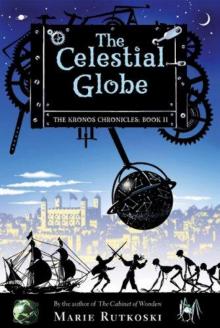 The Celestial Globe
The Celestial Globe The Shadow Society
The Shadow Society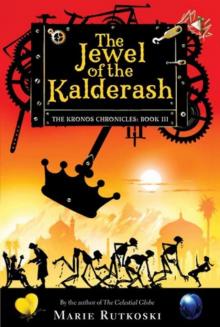 The Jewel of the Kalderash
The Jewel of the Kalderash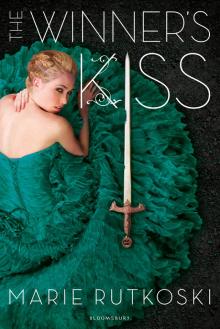 The Winner's Kiss
The Winner's Kiss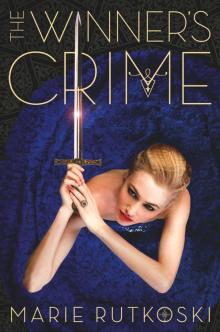 The Winner's Crime
The Winner's Crime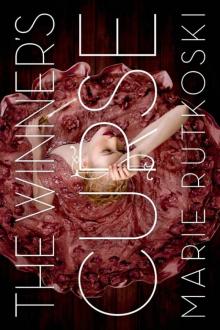 The Winner's Curse
The Winner's Curse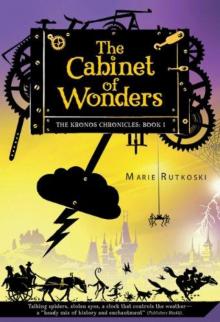 The Cabinet of Wonders
The Cabinet of Wonders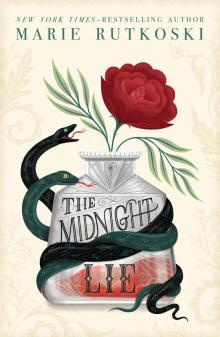 The Midnight Lie
The Midnight Lie The Hollow Heart
The Hollow Heart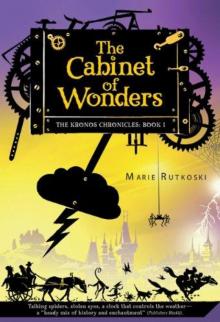 The Cabinet of Wonders: The Kronos Chronicles: Book I
The Cabinet of Wonders: The Kronos Chronicles: Book I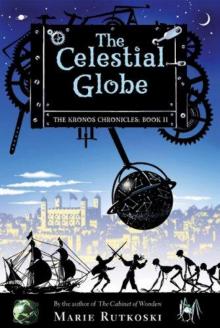 The Celestial Globe: The Kronos Chronicles: Book II
The Celestial Globe: The Kronos Chronicles: Book II